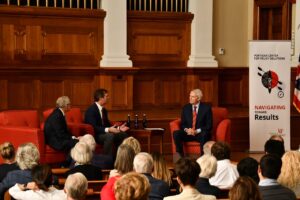[Note: The following is a reprint of the weekend edition of the Braver Angels Newsletter, originally published April 04, 2021. To receive the newsletter in your inbox, sign up here]
This is a sacred time.
It is sacred, not just for millions of Americans but for almost innumerable people of faith around the world. Today is Easter Sunday, called Resurrection Sunday by some. It is the day in which Christians commemorate the raising up of the messiah and the fulfillment of the promises of God leading unto salvation.
It follows immediately upon the end of the week of Passover. During Passover the Jewish people commemorate the liberation of the early Israelites from slavery in the land of Egypt, celebrating the freedom granted them by God and looking to the coming of messiah.
There are different ways to interact with religious belief, whether one is a believer or not. One way starts with imagining that we are all of us spiritual beings.
There is a part of the human soul, however we define it, that reaches towards transcendence. We sense it through feelings such as love, hope and gratitude. These feelings are anchored, for so many of us, in the stories of our faith and the journeys of our ancestors. They join stream with our hopes for ourselves, for our children and for the world.
(This was demonstrated beautifully in last night’s 2nd annual Braver Angels Seder hosted by artist and peace maker Micah Hendler of the Jerusalem Youth Chorus and Braver Angels Randy Lioz, who were joined by Pastor Franklin Ruff of the 1st Baptist Church of Stillwell, Kansas, and longtime Braver Angels member Peter Yarrow of Peter, Paul and Mary, among many others. Watch at the link above.)
The transcendent then is part of what connects us to those who have come before us, those who will come after as well as those with whom we share our now.
Earlier in the week, as a part of our America’s Public Forum event series, Luke Phillips and I had the joy of speaking again with Tara Isabella Burton (most recently author of Strange Rites: New Religions for a Godless World). We discussed spiritual life and the idea of self-creation in a world where technology and consumerism give us the impression that we can design our own realities.
See our conversation below:
America’s Public Forum: Self-Creation, Spirituality, And Politics in our Social Media World
“I think it’s wrong however to say that we are a more secular society…I think we’re seeing each of us starting our own religion, in a sense.” -Tara Isabella Burton
We are all of us chasing fulfillment. This often means we are chasing the transcendent – that which moves us beyond words.
In certain respects we may subconsciously seek to do this alone. We modern Americans cultivate our realities through technology, fashion and the things we consume perhaps to fill a space inside of us left vacant by a dimming understanding of what gives life meaning.
But the idea that God has intervened in human affairs to free a people from slavery, to open the gate to salvation, has anchored billions to the belief that our lives hold purpose. In these traditions that purpose is intimately bound to the need for us to serve one another.
As Jesus loved his enemies, fed the poor and spoke truth to power, so too are those who celebrate the resurrection taught to do likewise for their fellow man. The Torah, in many different ways, commands the Jewish people to be kind to the stranger and to labor together for the good of ones people.
There is significance in these things that is available to all of us, regardless of our particular religion or lack thereof. The beliefs that anchor the convictions of the Judeo-Christian tradition are only really given their fuller meaning insofar as we honor the moral obligations we have to one another through our deeds.
Do we serve one another? Do we honor one another? Do we edify one another? Do we forgive each other? Do our answers to these questions not indicate whether or not our hearts are rooted in hope, love and gratitude? Are we not more likely to be so when our own hearts have been touched by the compassion, the hope and love of our fellow human-beings?
A recognition of the mechanical utility of love in human society is not what inspires us towards it. A belief in love, God’s love in the context of the Passover and Easter stories, inspires the conviction that the love that pours from God into humanity gives us the means by which we may uplift one another towards a holier way of being. We are required to be in service to one another, not merely to survive but to truly live.
The spiritual truth of these stories transcends the myth or history that is the stories themselves.
This truth is evident in psychology, politics, art and philosophy: we must believe in something (an idea, a cause) that we regard as greater than ourselves alone to find the greater meaning of our lives.
When we have found belief, and hope, in something greater than ourselves we have found a purpose large enough to allow us to serve other people as if their joys were our own.
We go beyond ourselves, finding ourselves liberated, saved and made whole in the chorus of goodwill by which we as individuals sing a more loving world into being as one.
We do not all speak the language of faith. But the language of faith, in so many respects, echoes forth from the better angels of our nature.
So today let us honor the Passover and Easter holidays. And let us believe together in an American tomorrow wherein we love one another as we love ourselves.
-John Wood, Jr.
National Ambassador
Braver Angels
P.S.: We have a week full of events coming up, including a forum on multiparty democracy, book club and film club events, and an online Depolarizing Within workshop this coming Saturday. See what’s upcoming here.
Not a member yet? Become a part of Braver Angels today.




